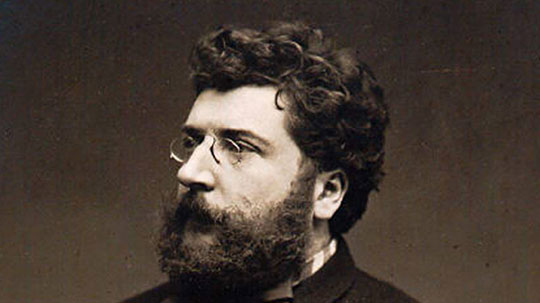During its first production at the Opéra Comique in March 1875 much of the public was puzzled and indifferent although a few well-wishers ventured to applaud occasionally. The Quintet and the Toreador’s Song made favourable impressions and the prelude of the Act II was encored. However, apart from that the evening could not have been called a success.
Bizet, with his masterpiece, had managed to break loose from the classical French style. His music displayed startling and novel features for which the polite tastes of the French public were not prepared. Carmen limped on but closed after only thirty-seven performances.
Musical history records plenty of similar examples but few so sad as Bizet died only three months after his Carmen has been so coldly received and just a short time before it began to receive the praise and success it deserved.
But with the first performance (in Italian) of the Carmen in England its ever increasing popularity truly began. This performance took place on the 22nd June 1878 with Miss Minnie Hauck, the young American Prima Donna, performing the role of the eponymous heroine.
The highly controversial portrayal of proletarian life, immorality and lawlessness, as well as the main character’s tragic death on stage, broke new ground in French opera.
After the premiere, most reviews were critical and the French public remained generally indifferent. Carmen initially gained its reputation through a series of productions outside France and was not revived in Paris until 1883.
Thereafter it rapidly acquired celebrity at home and abroad and continues to be one of the most frequently performed operas.
The Opera was written in the genre of opéra comique, with musical numbers separated by dialogue. Later commentators have claimed that Carmen forms the bridge between the tradition of opéra comique and the realism or verismo that characterised late 19th-century Italian opera.
In the Paris of the 1860s, although he was a Prix de Rome laureate, Bizet struggled to get his stage works performed. The French capital’s two main state-funded opera houses − the Opera and the Opera-Comique performed conservative repertoires that afforded few opportunities for young native talent.
When artistic life in Paris resumed after the Franco-Prussian War of 1870–71, Bizet found wider opportunities for the performance of his works.
Despite Djamileh failing in 1872 it led to a further commission from the Opera-Comique, this time for a full-length piece for which Henri Meilhac and Ludovic Halevy would provide the libretto.
It was Bizet who first proposed an adaptation of Prosper Mérimée’s novella Carmen. Mérimée’s story is a blend of travelogue and adventure, probably inspired by the writer’s lengthy travels in Spain in 1830. It may have been influenced in part by Alexander Pushkin’s 1824 poem The Gypsies, a work Mérimée had translated into French.
It has also been suggested that the story was developed from an incident recounted to Mérimée by his friend the Countess Montijo. Bizet may first have encountered the story during his Rome sojourn of 1858–60, since his journals record Mérimée as one of the writers whose works fascinated him during those years.
After the composer’s death the score of Carmen was subject to significant amendments, including the introduction of recitative in place of the original dialogue.
There is no standard edition of the opera. Differences of opinion exist as to which versions best express Bizet’s intentions.
Carmen has been recorded many times since the first acoustic recording in 1908 and, over the years, the story has been the subject of many screen and stage adaptations.




















































































